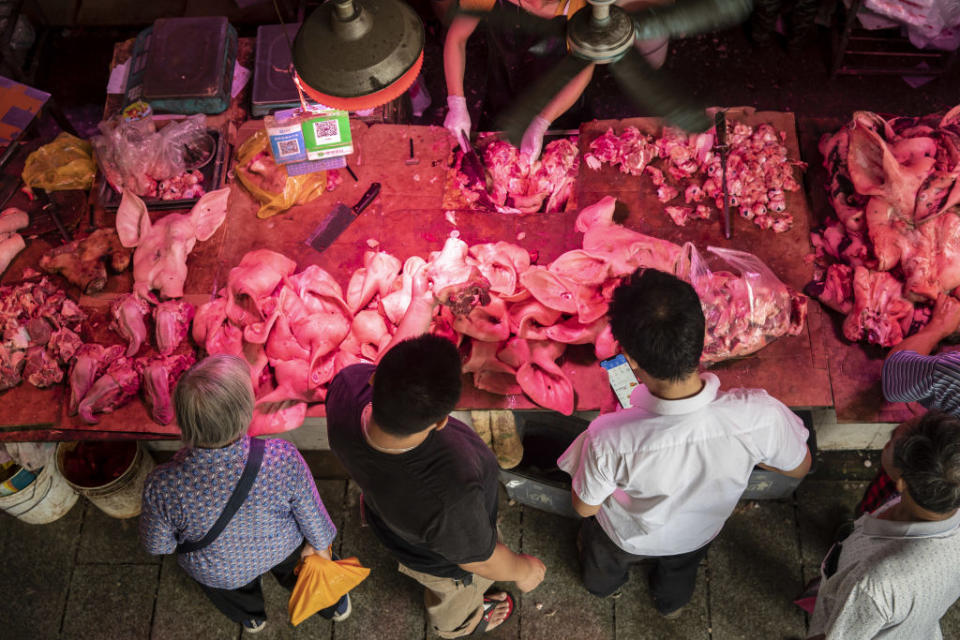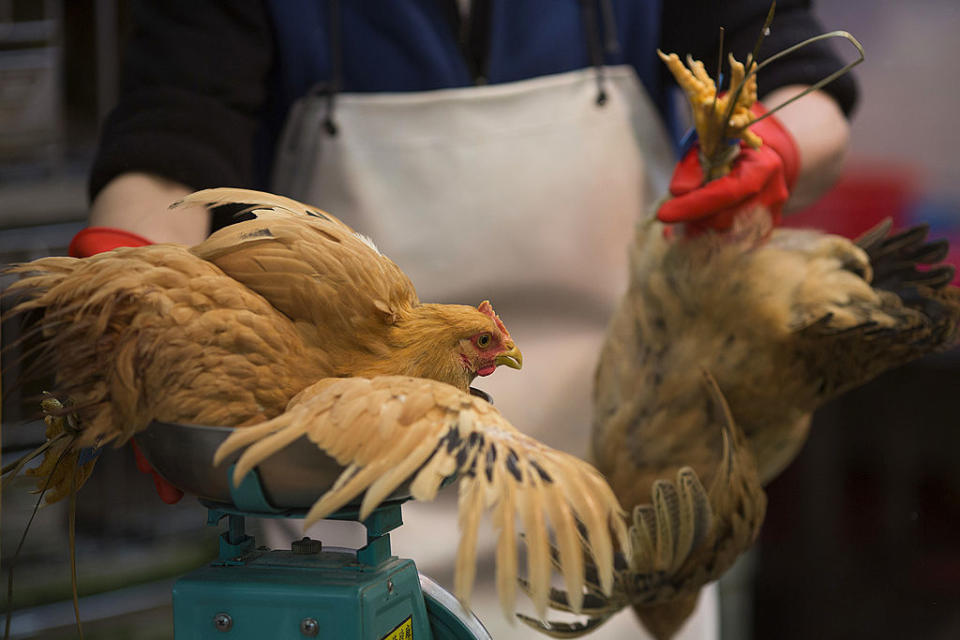Coronavirus: The story behind WHO's 'puzzling' wet markets decision
The World Health Organisation has come under fire from world leaders including Scott Morrison for appearing to support the re-opening of China’s controversial wet markets.
The coronavirus pandemic is believed to have originated late last year among wild animals on sale in a seafood market in Wuhan that has been closed and boarded up since January.
A common sight across Asia, wet markets traditionally sell fresh produce and live animals in the open air.
They tend to be popular with shoppers who believe the items on sale are cheaper and fresher than in supermarkets.

But the sea of sometimes exotic animals, including those that are traded and killed on site, is seen as a moral and health hazard by many in the West and the latest coronavirus outbreak has thrust a harsh spotlight on the country’s wet markets with growing calls for them to be shut down.
According to The Australian, the World Health Organisation supports the re-opening of such markets “because they are a source of livelihood and food security for many people”.
In the report, which also prompted a scathing editorial by the paper, the WHO’s Western Pacific regional headquarters said: “With adequate facilities, proper regulation and good hygiene practices it is possible to have safe food sold in wet markets.
It drew swift condemnation from prime minister Scott Morrison who called the decision “puzzling”.
“It’s unfathomable, frankly,” he told Nine’s Today on Tuesday morning.
“We need to protect the world against potential sources of outbreaks of these types of viruses. It’s happened too many times. I’m totally puzzled by this decision.”
But while many in the media were sharpening their knives, a WHO special envoy on COVID-19 and special representative of the United Nations secretary general for food security and nutrition, Dr David Nabarro, told a rather different story.
Speaking to the BBC on Monday, local time, he said it was the WHO’s advice to China, and other countries, to close down wet markets but said the organisation doesn’t have the power to compel countries to do so.
“Instead, what we have to do is offer advice and guidance, and there’s very clear advice from the Food and Agriculture Organisation and WHO that said there are real dangers in these kinds of environments.
“Seventy-five per cent of emerging infections come from the animal kingdom. It’s partly the markets, but it’s also other places where humans and animals are in close contact,” he said.
In a statement to Yahoo News Australia, the WHO said it “maintains that governments should rigorously enforce bans on the sale of exotic wildlife. And they must enforce food safety and hygiene regulations to ensure that food that is sold in markets is safe.”
Are wet markets really that dangerous?
Dr Feng Chongyi, an associate professor in China Studies at the University of Technology Sydney and adjunct Professor of History at China’s Nankai University, believes the Chinese government and the Chinese population should take a lesson from the virus outbreak attributed to the Wuhan wildlife market.
While the contents on offer and the hygiene practices on display may differ, defenders of the wet markets claim the attraction for consumers in countries like China isn’t so different from that of farmers’ markets in Western countries.
It is a minority of “horrible businesses” that are sometimes facilitated by low-level government corruption that pose a health risk, Dr Chongyi told Yahoo News Australia.

While most wet markets are “very critical” to the economy and food supply of Chinese (and other Asian) cities, it is the “horrible businesses” that trade wild animals that are a problem.
“The seafood markets, that is normal society, that is normal business,” he said.
“The issue of Chinese wet markets is those that sell wild animals … those carry the virus (risk).”
China has already passed laws to prohibit the trade of certain animals, “but it’s due to the corruption, offical corruption, that allows these businesses to continue,” he said.
Although inconclusive, experts suspect the novel coronavirus was passed from a bat to another animal, possibly a pangolin, before jumping to humans.
The animal eaten in China that may have sparked deadly coronavirus
'Streets of horror': Wildlife trade continues despite coronavirus warning
In an opinion piece in Bloomberg last week, Asian-focused journalist David Fickling called for an end to the outrage over China re-opening its wet markets.
“Let’s put the outrage on pause. Wet markets are increasingly losing ground to supermarkets in China. If they’re showing resilience as suppliers of fresh goods, it’s precisely because consumers regard them as a healthier and more sustainable alternative,” he wrote.
“The prevalence of food-borne microbial illness in developing East Asia suggests that far from being cesspits of disease, wet markets do a good job of providing households with clean, fresh produce.”
He pointed to a lengthy 2015 study by the World Health Organisation which compared food-borne sickness, disability and death in different countries, in which the region encompassing the wet market zone from China and South Korea scored the best record behind the Americas, Europe and the rich countries of the Pacific Rim.
As for China, Dr Chongyi said the under pressure Chinese Communist Party is keen to re-open the markets as it looks to cast doubt over the origination of the virus and save face both at home and abroad.
“They want to demonstrate to the world that maybe the virus did not originate in China,” he said.
“And China is trying to do everything to calm down the population in order to get back to normality and re-open the economy.”

Questions over China’s influence over the WHO
The WHO has come under heavy criticism for its perceived cow-towing to China amid the coronavirus pandemic.
“WHO from the very beginning have not done a great job, from the very beginning they have operated too closely with the Chinese authorities,” Dr Chongyi told Yahoo News Australia.
“That has been a source criticism from countries around the world.”
As a world body the organisation has been criticised for being inherently political, particularly when it comes to issues like the recognition of Taiwan, on which it seems to be influenced by China.
Crucially, the WHO was slow to heed early warnings from the country about human-to-human transmission of COVID-19, while China reportedly covered up information.
“They have not performed their duty to do the decent investigation … or publish the information (that was) badly needed by the world,” Dr Chongyi said.
It’s this perception that prompted US president Donald Trump to threaten to cut off funding to the WHO last week.
About the same time, a bipartisan group of US politicians sent a letter urging the World Health Organisation to take “aggressive action toward a global shutdown of live wildlife markets and a ban on the international trade in live wildlife”.
Do you have a story tip? Email: newsroomau@yahoonews.com.
You can also follow us on Facebook, Instagram and Twitter and download the Yahoo News app from the App Store or Google Play.





